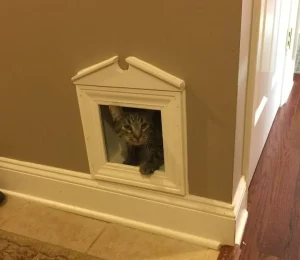In the olden days, when homes were sanctuaries of warmth and simplicity, the lives of humans and their feline companions were intertwined in a charming dance of mutual companionship. While the concept of modern cat doors as we know them today may not have existed, the ingenious adaptations made by homeowners in the past reflected a delightful commitment to harmonious living with their four-legged friends.

Old houses were often characterized by unique architectural elements that inadvertently catered to the needs of resident cats. Small openings beneath staircases, discreet nooks in walls, or cleverly designed vents provided feline occupants with convenient access to different parts of the house. These features, while functional, also added a whimsical touch to the overall ambiance.
In the absence of purpose-built cat doors, homeowners of yesteryear employed creative solutions to integrate pathways for their cats. Ingenious designs included small doors concealed within paneling or hidden behind furniture, allowing cats to come and go without disrupting the visual harmony of the home. These hidden passages became charming secrets shared between humans and their feline companions.
Gardens and outdoor spaces were integral components of homes in days gone by, and homeowners took pride in creating environments that catered to their cats’ natural instincts. Low windows, strategically placed ledges, and even custom-built structures provided outdoor-loving cats the freedom to explore while remaining close to home.





